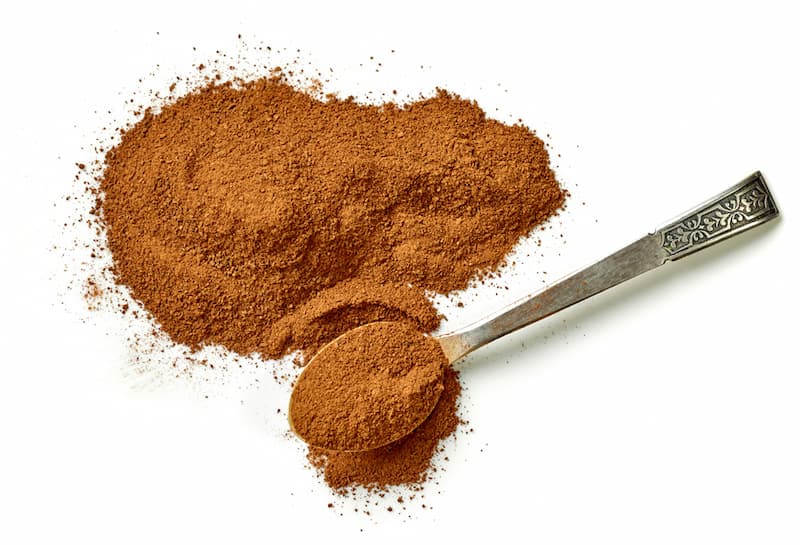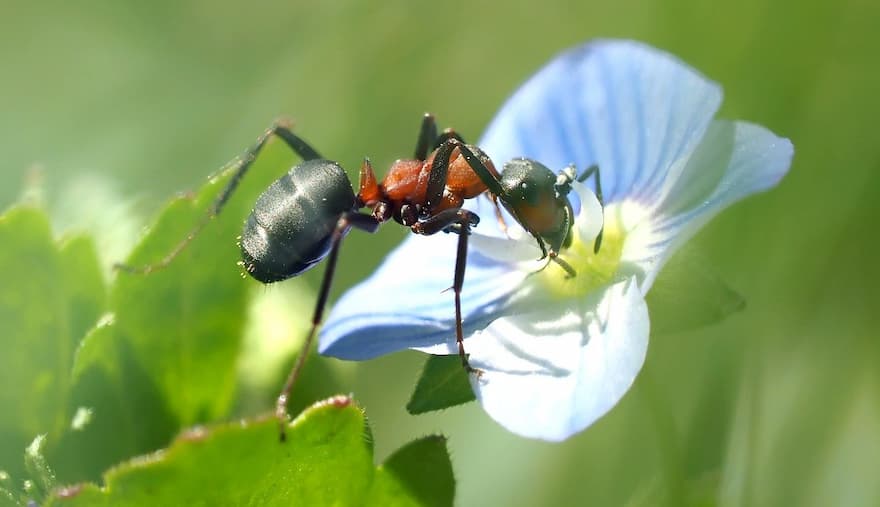Ants are a pest that are difficult to eradicate because they are persistent. This is due to the fact that they procreate rapidly and that cinnamon oil only temporarily scares ants away.
The best cinnamon remedy for eradicating these pests is cinnamon essential oil. As cinnamon oil is quite potent, it is best to use this diluted.
So, does cinnamon kill ants?
Cinnamon oil can kill ants, but cinnamon powder works better as an ant deterrent. The ants want to avoid the cinnamon because it produces an offensive smell.
Continue reading.
Table of Contents
Can You Kill Ants With Cinnamon?
Cinnamon itself typically doesn’t kill ants, but cinnamon oil can. Instead of killing the ants, the cinnamon powder serves as an ant repellent.
The ant colony will start searching for a new location to establish its home if you use too much cinnamon in one spot and it overpowers the smell.
Put cotton balls with cinnamon oil on them and place them where ants enter your home. Common locations include baseboards or windowsills of rooms close to exterior-access doors. You could also combine it with water and mist the area with it.
The process is the same for killing ants with cinnamon oil, but a stronger concentration of the essential oil is required.
Ants: Can Cinnamon Get Rid Of Them?
Cinnamon is a great way to get rid of ants. Ants are among the numerous insects that cinnamon oil has been shown to be effective against. According to a study, cinnamon essential oil can somewhat kill and repel ants.
Powdered cinnamon doesn’t do a great job of killing ants. However, it deters them and can stop more from returning.
Being safe to use around children or pets makes it a popular remedy.
Use cinnamon oil extract when using the spice. Depending on the severity of your issue, it should be diluted at a ratio of 1-20%.
In areas of your home where ants may enter or congregate, use a spray bottle or mister to apply the solution.
Cinnamon Powder Vs. Essential Oils
There are various forms of cinnamon. Cinnamon essential oil extract diluted in water is the most effective method for pest control.
Compared to the powdered version, the essential oil is much stronger. This indicates that it has a stronger odor that will get rid of ants more quickly.
The powdered version’s effectiveness against ants is unknown. Some assert that the ants can breathe it in and suffocate.
Are Ants Cinnamon Fans?
Because of its potent smell, ants do not like cinnamon.
For foraging and communication, ants rely heavily on their sense of smell. They get upset by very strong smells, which is why they usually avoid them.
This is one of the reasons why cinnamon is so effective at warding off ants.
Lavender, peppermint, and coffee smells are other offensive odors to ants.
How Does Cinnamon Against Ants Work?
The organic substance cinnamaldehyde is present in cinnamon. The compound that gives cinnamon its flavor and aroma also serves as a natural ant repellent thanks to cinnamonaldehyde.
The cinnamon oil is safe for kids and pets and repels the ant colony without harming it. Cinnamon also aids in warding off other pests like cockroaches, fleas, and moths.
Cinnamon oil can kill ants in high concentrations, but this is less effective than using it to repel them. See more about Does Baking Soda Kill Ants?
Why Is Cinnamon Good For Ant Control?
Cinnamon is a good remedy against ants for several reasons:
- It’s cheap.
- Both children and pets are safe there.
- It can be applied to kill and repel ants.
Cost-effective
An inexpensive method to get rid of ants in your house is to use cinnamon oil. You won’t spend a lot of money and can get years of use out of a single bottle of cinnamon essential oil.
Child Safe (when Diluted)
An excellent natural remedy for getting rid of ants is cinnamon. Cinnamon oil not only deters them but also has the power to suffocate and kill the nasties. Even though cinnamon isn’t toxic to people or animals in small doses, you should always dilute it with water before applying it to your floors or any other surfaces in the house.

Pet Friendly
A secure and pet-friendly method of ant control is cinnamon. Children can safely use this method to get rid of ants. Cinnamon oil shouldn’t be applied topically because it can be harmful if consumed by children or pets.
Why Don’t Ants Enjoy Cinnamon?
Strong-smelling substances like cinnamon can overpower an ant’s extremely keen sense of smell, which they use to locate food and navigate.
This superior ability, though, can be a double-edged sword for them. If they approach or come into contact with objects that have a strong aroma, it will impair their keen sense of smell. A spice known for its potent flavor and long-standing reputation for its potent aroma, cinnamon is frequently used in cooking.
For most household ant species, cinnamon has a pretty satisfactory effect and does a great job of keeping them away, though the level of effectiveness varies from one ant species to another.
Because they rely so heavily on one another to complete every task for the colony, ants find it crucial to maintain constant communication with one another.
The majority of the ants you see swarming around your home or garden are worker ants that are scouring the area for food.
The application of cinnamon may deter them from moving about in areas where it has been applied.
How To Use Cinnamon Essential Oil Against Ants
Cinnamon oil can be used in several ways to control ants:
- One method is to place cotton balls soaked in cinnamon oil where you have observed ants.
- Another strategy is to make a spray of cinnamon and water and apply it to the ants’ path. Spritz their entrances as well.
Locate The Source (where Ants Enter)
Identifying their source is the first step in using cinnamon oil to repel ants. When there are only a few ants in a particular part of a home, people frequently assume that the entire place is infested.
Follow the ants outside your home as they leave, or visit each entrance and look for ant signs.
Mix Essential Oil With Water
Cinnamon essential oil and water should be combined in a ratio of one part cinnamon oil to 99 parts water. You can either smear the solution around your home after diluting it in a spray bottle or dab it on all the areas where you see ants crawling. While the cinnamon won’t actually kill the ants, it can keep them away from your home so they don’t become a pest.
Applying cinnamon oil to ant trails is the best place to do so. Ant trails are routes that ants have marked with pheromones to show other ants where to go for food.
You’ll have a much better chance of success if you can get rid of these ant trails.
Wipe Down Affected Surfaces And Entry Points
Start by removing any ants by wiping down the impacted surfaces and entry points. Cinnamon oil applied afterward will stop them from returning.
Where To Apply Cinnamon To Deter Ants
Spray cinnamon oil where ant infestations are more likely to occur if you use it.
- Cracks in the walls
- Around plumbing pipes
- Damp areas around the sink, washing machine and dishwasher
- Around window and door frames
- In and around kitchen cabinets
- Anywhere garbage and laundry are stored
- Damp areas where water drains away
Cotton balls can also be covered in cinnamon oil and scattered throughout your home. The areas where you frequently see ants moving around can also be simply rub with them.
Instead of just scattering it about, you should use cinnamon power to create a border. Use it to mark the locations where you frequently discover large numbers of ants hiding out.
You may want to sprinkle cinnamon powder directly on their anthill or in the garden areas where they frequently gather, especially where they enter the house.
Does Cinnamon Work Well As An Ant Repellent Or Insecticide?
A Cornell study investigates how cinnamon essential oil affects various organisms. Ants are not on the list of insects that a cinnamon essential oil can repel. Sadly, bees are also killed by it. [source]
Researchers from Universiti Teknologi MARA Perlis also investigated the potential utility of cinnamon essential oil as an insecticide or ant repellent.
They found that when they added 20% more cinnamon essential oil to their medium, ants were consistently repelled for an hour.
At lower concentrations, however, cinnamon oil lost its ability to ward off ants after 30 minutes.
The research also revealed that a 20% cinnamon essential oil mixture killed all ants exposed to it for at least 90 minutes.
It initially seems promising to use cinnamon essential oil. However, it’s not a good idea to use cinnamon oil inside your pot because it needs to contain 20% cinnamon essential oil or more for it to work.
Since the required quantity of cinnamon is neither practical nor beneficial to your plant, you cannot use it to get rid of ants in potted plants. Their scent trails, however, can be altered by cinnamon.
Does Cinnamon Affect Plants?
The same Cornell study that was previously mentioned claims that cinnamon essential oil may be phytotoxic to plants. This means that cinnamon has the potential to harm plants and stunt their growth.
Despite the fact that cinnamon essential oil has antibacterial and antifungal properties, they are most definitely insufficient to counteract the potential stress that receiving high doses of cinnamon essential oil could cause to your plant.
How Should I Handle Ants In My Potted Plant?
To prevent the ants from further infesting your home, the first thing you should do when you discover ants in a potted plant is take the pot and plant outside.
You should either eliminate or relocate the colony if you have a larger plant with one.
Is It Accurate To Say That Ants Won’t Attack Raw Honey?
If ants try to eat the sticky pure honey, ants will be stuck. So, at first the ants will not be attracted by pure honey, but as honey tends to absorb moisture from the air making the outer layer of the pure honey to be diluted, then ants will be attracted to the pure honey eventually.
Does Organic Pure Honey Draw Ants?
The fact that a food item is organic has no bearing on how appealing it is to insects. Similar to non-organic honey, organic honey will also draw ants.
One might even argue that there is little to no difference between honey that is organic and non-organic. Every country has a different standard for “organic”, and currently, some producers are allowed to use a “USDA Organic” label for honey produced in other countries which has a different standard of “organic”. The USDA doesn’t have any specifications for what constitutes organic honey.
Conclusion
Since ancient times, people have used cinnamon to keep ants out of their homes. It interferes with the ants’ capacity for pheromone communication and pheromone detection. They become frightened as a result and attempt to stay away from strong scents at all costs.
To keep these little pests out of your home, try using cinnamon powder or oil, but if your problem is severe, hiring a reputable pest control company is always the best course of action.
If you decide to use the powder, you can use it to create a boundary for their entry points into your home.
They would typically never cover those boundary trails, according to several experiments. However, if you use powder, you might need to use it more frequently than if you made a cinnamon oil and water spray.
For the best results, spray your house with cinnamon oil at least once a week if you choose to use it.
Regarding your reading, I thank you.













